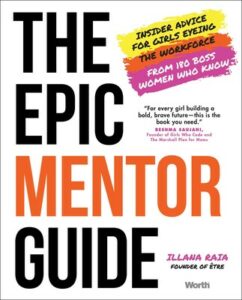Mentoring is widely considered critical to career advancement as well as success as an entrepreneur. This is even more true for female business owners and professionals. Mentoring is a key element that when utilized more frequently, we would advance more women in the workplace and help more women take their businesses to the next level.
There are stereotypes about women competing and rivaling each other as professionals. However, according to the Women as Mentors: Does She or Doesn’t She?, A Global Study of Businesswomen and Mentoring, the number one reason cited for why women mentor is because they want to be supportive of other women (80 percent agreed). Additionally, the majority of women (74 percent) indicated that they mentor because they have benefited from their own mentorship experiences. The study’s data shows that women are more likely to sponsor each other and help each other reach their professional goals.
If women want to help other women, why then are they not more engaged in it? It’s because they aren’t asking for help. It’s a common trait in women. We know we need help but don’t ask for it. Women need to raise their hands more frequently, speak up for themselves and seek someone to mentor them.
In the newly released book The Epic Mentor Guide: Insider Advice for Girls Eyeing the Workforce from 180 Boss Women Who Know by Illana Raia, the author describes the importance of asking someone to be your mentor. She says that when we find someone who we would like to mentor us, we should reach out to them with a specific question. Connect on LinkedIn or another platform and send a private message with one question. If you read a blog that someone wrote or a post on LinkedIn or social media that struck a chord with you, then mention what stood out to you. Then ask for help in one area. Be specific and be concise. If you say too much in your first contact, then the potential mentor might not make the time to answer. When you keep your question clear and concise, it gives that woman a chance to answer succinctly herself. That one question can then lead to another one and potentially lead to the big question of ‘would you be willing to mentor me?’

The majority of women would answer yes to that question, unless their schedule is just overwhelming. It’s an honor to be asked to mentor someone. At least that’s how I feel when I’ve been asked. This is because I have been on the receiving end of free wisdom, advice and even a shoulder to cry on over the years multiple times. Several women have taken the time to mentor me. More often than not, without me even asking. As I look back now to my mid 20’s I can think of a few women who embraced me for all of my faults and took me under their wing and provided guidance in a gentle but firm manner. I didn’t see the power of what they had done for me until I was in my 40’s and now I am just incredibly grateful for those women and the others who did the same for me in the following decades.
According to Merriam-Webster, a mentor is ‘a trusted counselor or guide’. A mentor is someone who has decided to take the time to connect with you to help you in one way or another. Here are a few benefits of mentoring for female business owners.
- Mentoring helps women entrepreneurs avoid costly business mistakes.
- Learning from those that have gone before us is critical.
- Mentoring helps improve operational performance.
Running a business is hard and there is no one way to do things. Seeking advice and guidance can increase efficiencies and lessen time to achieve profits. - Mentoring improves networks.
You are only as good as the company you keep. Having access to another woman’s network can open new doors to business, new opportunities, and increase the visibility of your brand - Mentoring gives you access to funding knowledge.
Mentors can serve as a reference for investors or help guide a women-owned company through financing. - Mentoring gives you a strong support system.
When things go wrong or right, you want an advocate on your side. Someone who you can count on as well as a cheerleader that is always in your corner.

Now that we’ve discussed why participating in mentoring is important for women in business, let me caution you about expectations. The mentoring process is fluid and ever changing. It’s about the people in the process. Have opening communication about what each of you can give (time, resources), and what each of you expects from the other will set the relationship up for success.
Mentoring from one person to another can be different and may not work out the way you had hoped. That is all right. That mentoring partnership was not a good fit. You do not know until you get into it. If it doesn’t work out, don’t give up. Look for another mentor. Find someone in your field or industry. Interview each other. Share how you approach mentoring if you are the mentor. Be clear on your time constraints and your approach.
If you are the mentee, don’t expect a mother figure. That’s not what mentoring is. You also cannot expect all the answers. Being a good mentor is often about asking the right questions and letting the mentee come up with the answers. Both parties need to be open, adaptable and communicative. For more about women and mentorship, and how to be a good mentor, read How to mentor and support other women — and help them succeed by Pat Mitchell on Ideas.Ted.com.

About the Author
Tamara Payne has been an entrepreneur in one way or another most of her life. She is a community builder, master connector, advocate for women in business and a leader in the small business community.
She is the co-founder and CEO of Ensemble, a collaborative business community and coworking space in Near Southside of Fort Worth in 2016 with a mission to grow businesses and invest in people through connections, collaboration and community. Ensemble is proud to be the first woman-owned coworking space in North Texas.’
Tamara is also Principal Consultant at Payne Free Consulting, where she advises small business owners and their teams on mastering the core elements of running a business to create sustainable success.
In 2020, Tamara added city councilwoman to her list of titles when she was elected to Burleson city council. She joined the staff at Tarrant County College in the Fall of 2021 as Adjunct Professor teaching small business & entrepreneurship to aspiring entrepreneurs.



